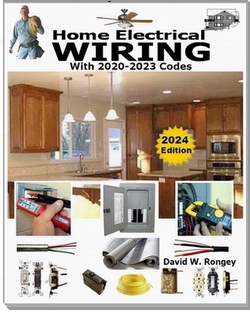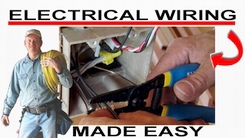» Residential Wiring Codes
» Need Electrical Help? Ask the Electrician
Electrical Code - Ceiling Fan Boxes

|
Summary: This article explains the Electrical Wiring Code for the Boxes that support Ceiling Fans, also known as Paddle Fans. © By: Dave Rongey |
Installing Electrical Wiring Boxes for a Ceiling Fan or Paddle Fan
Electrical Codes for Ceiling Fan Support
Ceiling fans weigh more than most ceiling fixtures. Therefore ceiling fans must be supported properly to prevent them from falling.
To properly install a ceiling fan and provide the necessary support there are two methods that must be followed:
An approved fixture box designed to support the weight of the ceiling fan must me installed.
The fixture box must be attached to supported structure components such as wood ceiling joists or wood blocks that are properly fastened between two ceiling joists.
Approved ceiling fixture boxes that have expandable bar hanging devices can be used when installed by following the instructions supplied by the manufacturer.
| Electrical Code |
Electrical Boxes for Ceiling Paddle FanWhere a box is used as the sole support for a ceiling paddle fan, the box must be listed for this purpose and include the weight of the fan. Ceiling paddle fans not in excess of 35 lb. can be supported directly to an outlet box that is identified for this purpose [422.18(A)]. Ceiling paddle fans exceeding 35 lb. must be supported independently of the outlet box, unless the box is listed to support the weight of the fan [422.18(B)]. Figure 314-5 |
 Image Mike Holt |














